(人教版2019)高考英语 一轮复习夯实基础必背知识清单 专题05.必修第3册 Unit5 The Value of Money
文档属性
| 名称 | (人教版2019)高考英语 一轮复习夯实基础必背知识清单 专题05.必修第3册 Unit5 The Value of Money |
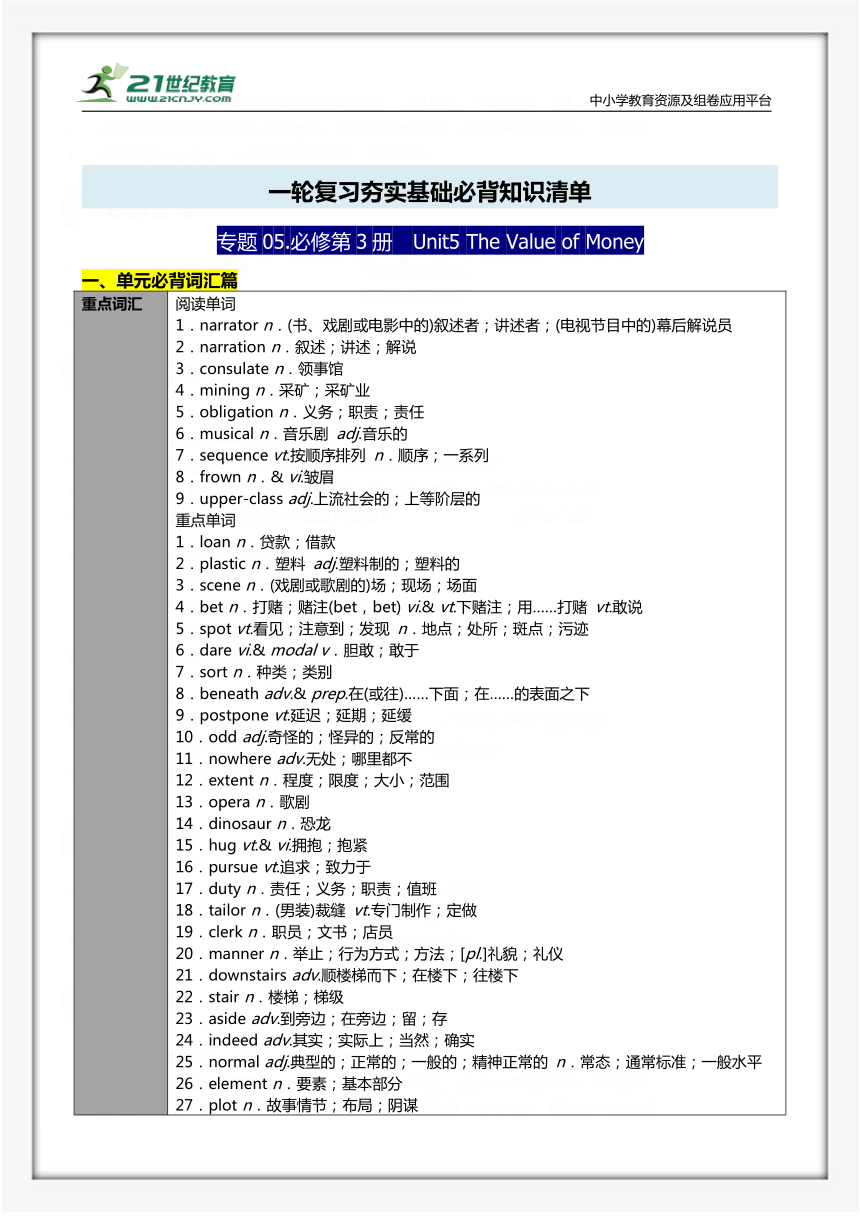
|
|
| 格式 | docx | ||
| 文件大小 | 118.8KB | ||
| 资源类型 | 试卷 | ||
| 版本资源 | 人教版(2019) | ||
| 科目 | 英语 | ||
| 更新时间 | 2022-11-18 00:00:00 | ||
图片预览

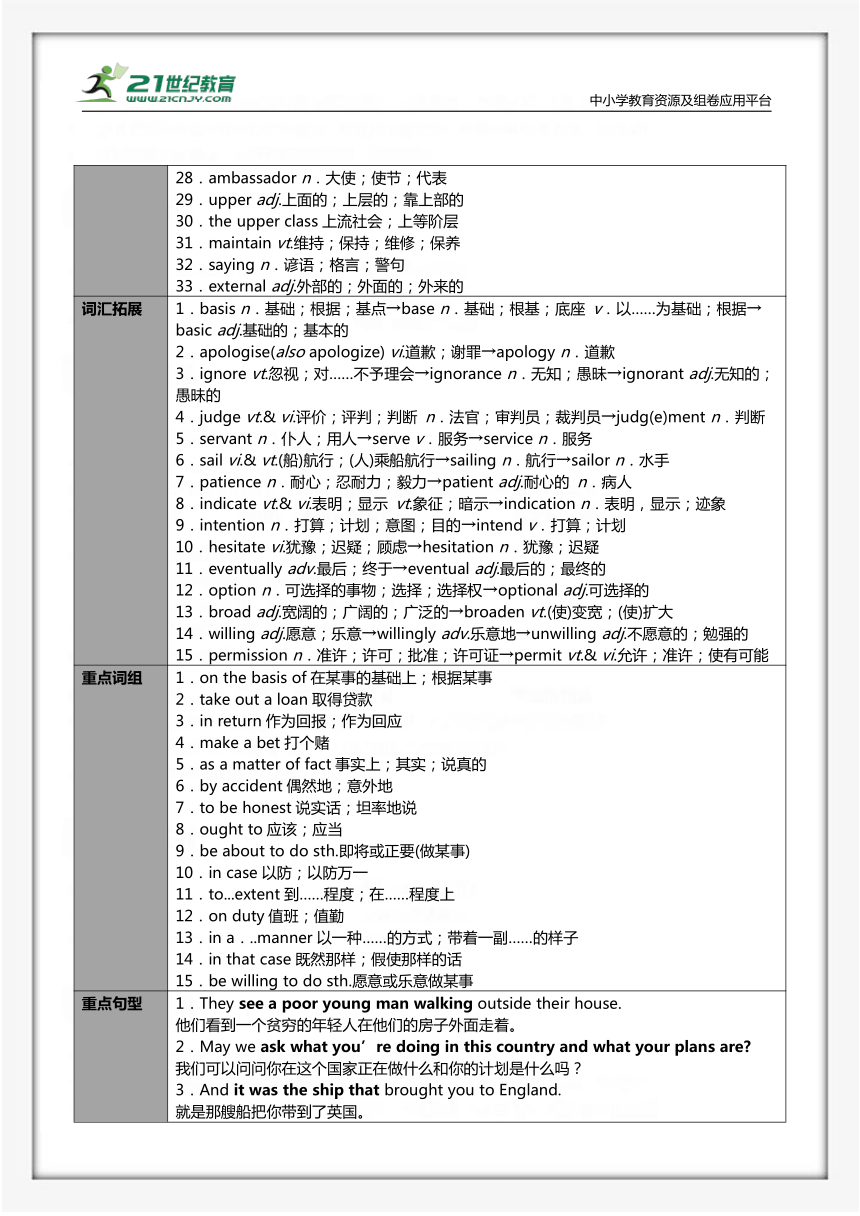
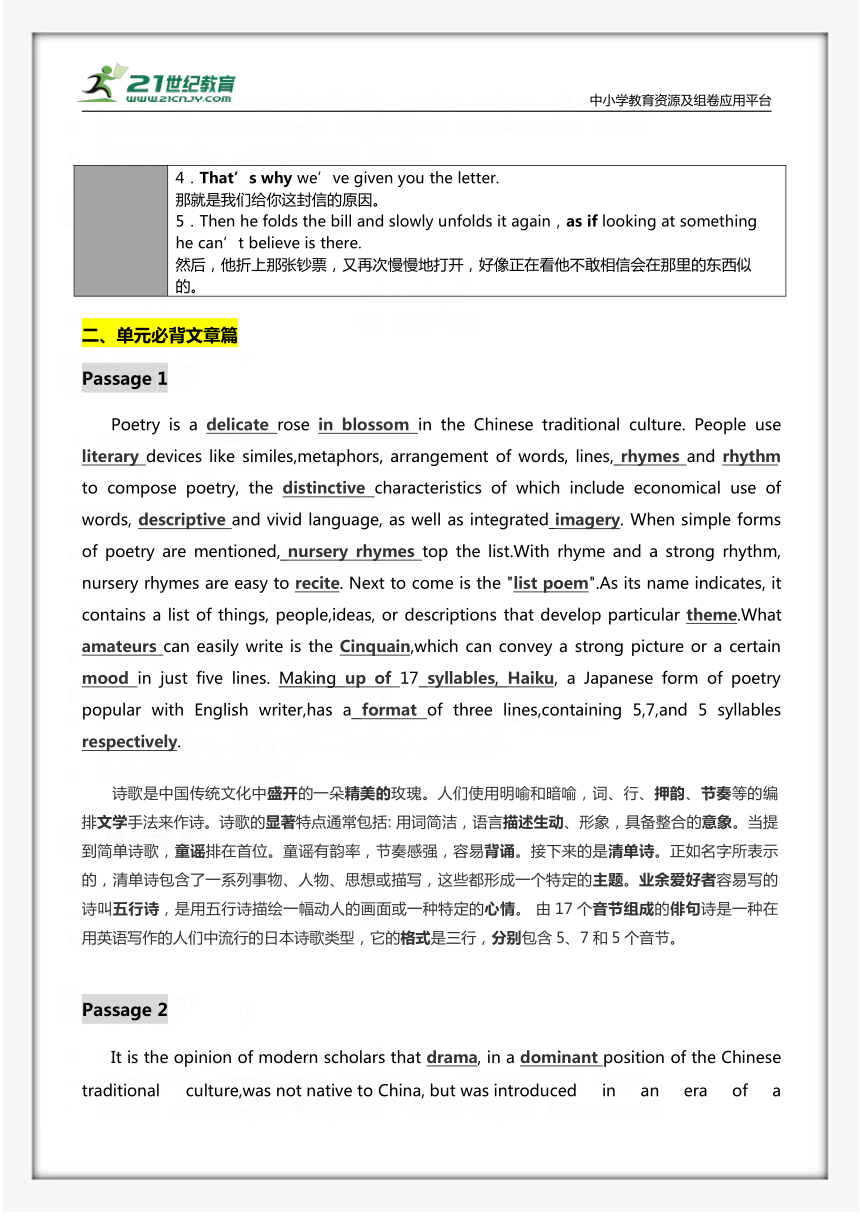
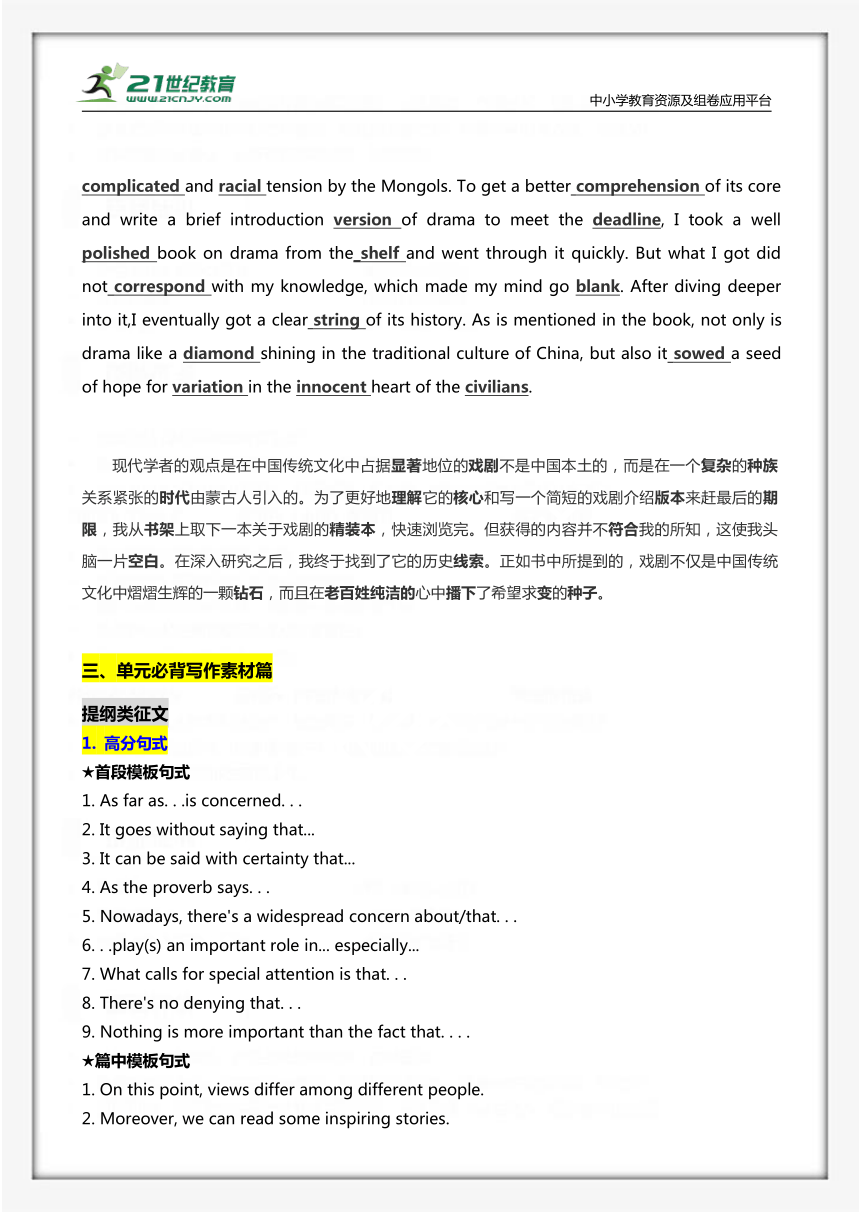
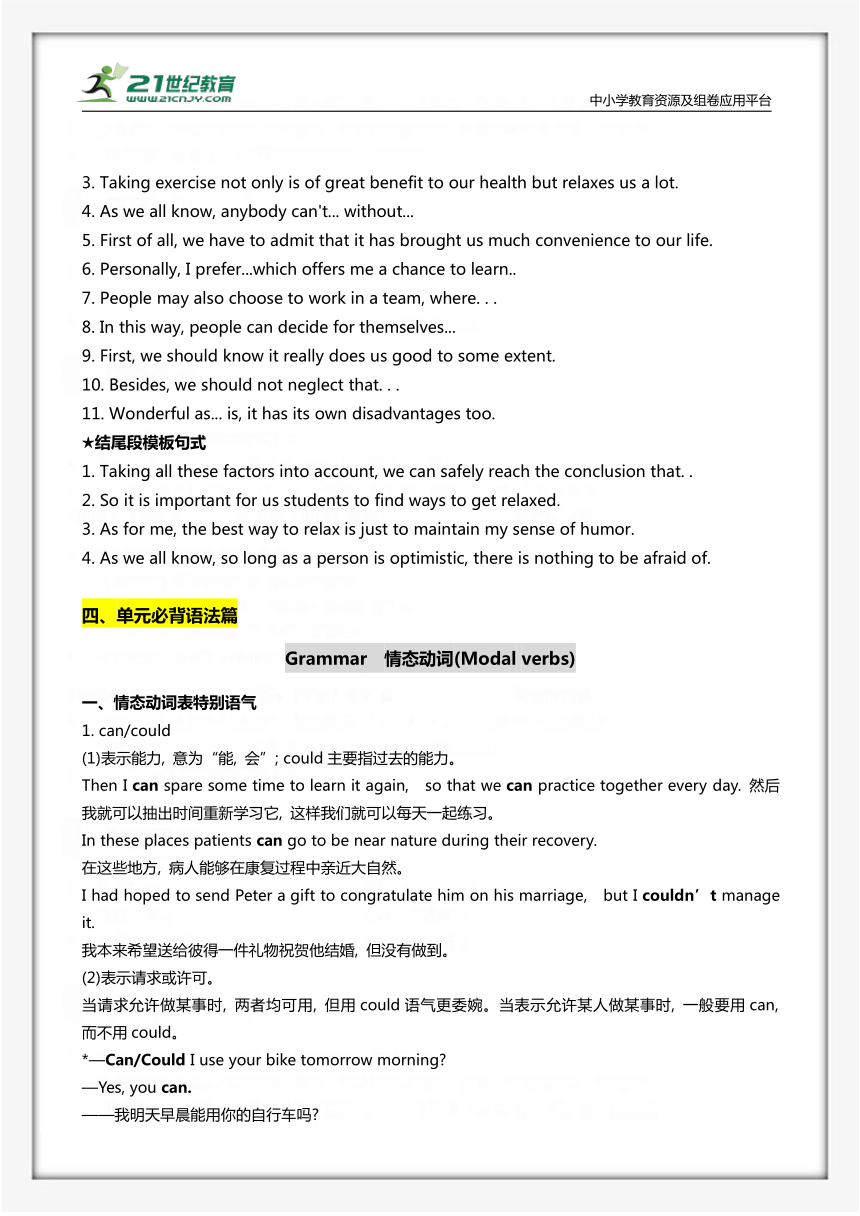
文档简介
中小学教育资源及组卷应用平台
一轮复习夯实基础必背知识清单
专题05.必修第3册 Unit5 The Value of Money
一、单元必背词汇篇
重点词汇 阅读单词 1.narrator n.(书、戏剧或电影中的)叙述者;讲述者;(电视节目中的)幕后解说员 2.narration n.叙述;讲述;解说 3.consulate n.领事馆 4.mining n.采矿;采矿业 5.obligation n.义务;职责;责任 6.musical n.音乐剧 adj.音乐的 7.sequence vt.按顺序排列 n.顺序;一系列 8.frown n.& vi.皱眉 9.upper class adj.上流社会的;上等阶层的 重点单词 1.loan n.贷款;借款 2.plastic n.塑料 adj.塑料制的;塑料的 3.scene n.(戏剧或歌剧的)场;现场;场面 4.bet n.打赌;赌注(bet,bet) vi.& vt.下赌注;用……打赌 vt.敢说 5.spot vt.看见;注意到;发现 n.地点;处所;斑点;污迹 6.dare vi.& modal v.胆敢;敢于 7.sort n.种类;类别 8.beneath adv.& prep.在(或往)……下面;在……的表面之下 9.postpone vt.延迟;延期;延缓 10.odd adj.奇怪的;怪异的;反常的 11.nowhere adv.无处;哪里都不 12.extent n.程度;限度;大小;范围 13.opera n.歌剧 14.dinosaur n.恐龙 15.hug vt.& vi.拥抱;抱紧 16.pursue vt.追求;致力于 17.duty n.责任;义务;职责;值班 18.tailor n.(男装)裁缝 vt.专门制作;定做 19.clerk n.职员;文书;店员 20.manner n.举止;行为方式;方法;[pl.]礼貌;礼仪 21.downstairs adv.顺楼梯而下;在楼下;往楼下 22.stair n.楼梯;梯级 23.aside adv.到旁边;在旁边;留;存 24.indeed adv.其实;实际上;当然;确实 25.normal adj.典型的;正常的;一般的;精神正常的 n.常态;通常标准;一般水平 26.element n.要素;基本部分 27.plot n.故事情节;布局;阴谋 28.ambassador n.大使;使节;代表 29.upper adj.上面的;上层的;靠上部的 30.the upper class上流社会;上等阶层 31.maintain vt.维持;保持;维修;保养 32.saying n.谚语;格言;警句 33.external adj.外部的;外面的;外来的
词汇拓展 1.basis n.基础;根据;基点→base n.基础;根基;底座 v.以……为基础;根据→basic adj.基础的;基本的 2.apologise(also apologize) vi.道歉;谢罪→apology n.道歉 3.ignore vt.忽视;对……不予理会→ignorance n.无知;愚昧→ignorant adj.无知的;愚昧的 4.judge vt.& vi.评价;评判;判断 n.法官;审判员;裁判员→judg(e)ment n.判断 5.servant n.仆人;用人→serve v.服务→service n.服务 6.sail vi.& vt.(船)航行;(人)乘船航行→sailing n.航行→sailor n.水手 7.patience n.耐心;忍耐力;毅力→patient adj.耐心的 n.病人 8.indicate vt.& vi.表明;显示 vt.象征;暗示→indication n.表明,显示;迹象 9.intention n.打算;计划;意图;目的→intend v.打算;计划 10.hesitate vi.犹豫;迟疑;顾虑→hesitation n.犹豫;迟疑 11.eventually adv.最后;终于→eventual adj.最后的;最终的 12.option n.可选择的事物;选择;选择权→optional adj.可选择的 13.broad adj.宽阔的;广阔的;广泛的→broaden vt.(使)变宽;(使)扩大 14.willing adj.愿意;乐意→willingly adv.乐意地→unwilling adj.不愿意的;勉强的 15.permission n.准许;许可;批准;许可证→permit vt.& vi.允许;准许;使有可能
重点词组 1.on the basis of在某事的基础上;根据某事 2.take out a loan取得贷款 3.in return作为回报;作为回应 4.make a bet打个赌 5.as a matter of fact事实上;其实;说真的 6.by accident偶然地;意外地 7.to be honest说实话;坦率地说 8.ought to应该;应当 9.be about to do sth.即将或正要(做某事) 10.in case以防;以防万一 11.to...extent到……程度;在……程度上 12.on duty值班;值勤 13.in a...manner以一种……的方式;带着一副……的样子 14.in that case既然那样;假使那样的话 15.be willing to do sth.愿意或乐意做某事
重点句型 1.They see a poor young man walking outside their house. 他们看到一个贫穷的年轻人在他们的房子外面走着。 2.May we ask what you’re doing in this country and what your plans are 我们可以问问你在这个国家正在做什么和你的计划是什么吗? 3.And it was the ship that brought you to England. 就是那艘船把你带到了英国。 4.That’s why we’ve given you the letter. 那就是我们给你这封信的原因。 5.Then he folds the bill and slowly unfolds it again,as if looking at something he can’t believe is there. 然后,他折上那张钞票,又再次慢慢地打开,好像正在看他不敢相信会在那里的东西似的。
单元必背文章篇
Passage 1
Poetry is a delicate rose in blossom in the Chinese traditional culture. People use literary devices like similes,metaphors, arrangement of words, lines, rhymes and rhythm to compose poetry, the distinctive characteristics of which include economical use of words, descriptive and vivid language, as well as integrated imagery. When simple forms of poetry are mentioned, nursery rhymes top the list.With rhyme and a strong rhythm, nursery rhymes are easy to recite. Next to come is the "list poem".As its name indicates, it contains a list of things, people,ideas, or descriptions that develop particular theme.What amateurs can easily write is the Cinquain,which can convey a strong picture or a certain mood in just five lines. Making up of 17 syllables, Haiku, a Japanese form of poetry popular with English writer,has a format of three lines,containing 5,7,and 5 syllables respectively.
诗歌是中国传统文化中盛开的一朵精美的玫瑰。人们使用明喻和暗喻,词、行、押韵、节奏等的编排文学手法来作诗。诗歌的显著特点通常包括: 用词简洁,语言描述生动、形象,具备整合的意象。当提到简单诗歌,童谣排在首位。童谣有韵率,节奏感强,容易背诵。接下来的是清单诗。正如名字所表示的,清单诗包含了一系列事物、人物、思想或描写,这些都形成一个特定的主题。业余爱好者容易写的诗叫五行诗,是用五行诗描绘一幅动人的画面或一种特定的心情。 由17个音节组成的俳句诗是一种在用英语写作的人们中流行的日本诗歌类型,它的格式是三行,分别包含5、7和5个音节。
Passage 2
It is the opinion of modern scholars that drama, in a dominant position of the Chinese traditional culture,was not native to China, but was introduced in an era of a complicated and racial tension by the Mongols. To get a better comprehension of its core and write a brief introduction version of drama to meet the deadline, I took a well polished book on drama from the_shelf and went through it quickly. But what I got did not correspond with my knowledge, which made my mind go blank. After diving deeper into it,I eventually got a clear string of its history. As is mentioned in the book, not only is drama like a diamond shining in the traditional culture of China, but also it sowed a seed of hope for variation in the innocent heart of the civilians.
现代学者的观点是在中国传统文化中占据显著地位的戏剧不是中国本土的,而是在一个复杂的种族关系紧张的时代由蒙古人引入的。为了更好地理解它的核心和写一个简短的戏剧介绍版本来赶最后的期限,我从书架上取下一本关于戏剧的精装本,快速浏览完。但获得的内容并不符合我的所知,这使我头脑一片空白。在深入研究之后,我终于找到了它的历史线索。正如书中所提到的,戏剧不仅是中国传统文化中熠熠生辉的一颗钻石,而且在老百姓纯洁的心中播下了希望求变的种子。
三、单元必背写作素材篇
提纲类征文
高分句式
★首段模板句式
1. As far as. . .is concerned. . .
2. It goes without saying that...
3. It can be said with certainty that...
4. As the proverb says. . .
5. Nowadays, there's a widespread concern about/that. . .
6. . .play(s) an important role in... especially...
7. What calls for special attention is that. . .
8. There's no denying that. . .
9. Nothing is more important than the fact that. . . .
★篇中模板句式
1. On this point, views differ among different people.
2. Moreover, we can read some inspiring stories.
3. Taking exercise not only is of great benefit to our health but relaxes us a lot.
4. As we all know, anybody can't... without...
5. First of all, we have to admit that it has brought us much convenience to our life.
6. Personally, I prefer...which offers me a chance to learn..
7. People may also choose to work in a team, where. . .
8. In this way, people can decide for themselves...
9. First, we should know it really does us good to some extent.
10. Besides, we should not neglect that. . .
11. Wonderful as... is, it has its own disadvantages too.
★结尾段模板句式
1. Taking all these factors into account, we can safely reach the conclusion that. .
2. So it is important for us students to find ways to get relaxed.
3. As for me, the best way to relax is just to maintain my sense of humor.
4. As we all know, so long as a person is optimistic, there is nothing to be afraid of.
四、单元必背语法篇
Grammar 情态动词(Modal verbs)
一、情态动词表特别语气
1. can/could
(1)表示能力, 意为“能, 会”; could主要指过去的能力。
Then I can spare some time to learn it again, so that we can practice together every day. 然后我就可以抽出时间重新学习它, 这样我们就可以每天一起练习。
In these places patients can go to be near nature during their recovery.
在这些地方, 病人能够在康复过程中亲近大自然。
I had hoped to send Peter a gift to congratulate him on his marriage, but I couldn’t manage it.
我本来希望送给彼得一件礼物祝贺他结婚, 但没有做到。
(2)表示请求或许可。
当请求允许做某事时, 两者均可用, 但用could语气更委婉。当表示允许某人做某事时, 一般要用can, 而不用could。
*—Can/Could I use your bike tomorrow morning
—Yes, you can.
——我明天早晨能用你的自行车吗
——是的, 可以。
(3)表示惊异、怀疑、不相信等态度时, 意为“怎么能, 怎么会”, 主要用于否定句、疑问句或感叹句中, 用could时语气较委婉。
*How can you be so careless! 你怎么那么粗心呀!
【知识延伸】can与be able to的区别
①can只能用在一般现在时, 而be able to可用于更多的时态。
*He will be able to tell you the news soon.
他将能够很快就告诉你这个消息。
②表示过去特定的能力或经过努力才具备的能力, 只能用be able to。
*I talked with her for a long time, and finally I was able to make her believe me.
我和她谈了很长时间, 最终, 我让她相信了我。
2. must
表示现在或将来必须要做某事, 多是出于义务、责任或强制命令, 指说话人的主观意志。
Students must provide their presentations on CDs before Friday, March 23.
学生们必须在3月23日周五之前提供他们的展示光盘。
must用法点拨
(1)回答must引出的问句时, 如果是否定的回答, 不能用mustn’t, 而要用needn’t或don’t have to。
—Must we hand in our English exercise books
——我们必须交英语练习册吗
—Yes, you must. (No, you don’t have to. /No, you needn’t. )
——是的, 你必须要交。(不, 你不必)。
(2) must用于疑问句中, 可以用来表示责备、抱怨的感彩, 意为“偏要, 硬要”。mustn’t的意思是“禁止”, 而不是“不必”。
*Must you interrupt me now Can’t you see I’m on the phone
你非要现在打断我吗 难道你没看见我在打电话吗
【知识延伸】
have to表示“必须, 不得不”, 意义与must很接近, 但must表示主观意志, 而have to表示由于客观因素不得不做某事, 并且可用于更多的时态。
I work not because I have to, but because I want to.
我工作不是因为我不得不工作, 而是因为我想工作。
*We must promote our environmental awareness and behave ourselves. 我们必须提高环保意识, 并规范我们的行为。
3. may/might
(1)表示请求时, 两者都可用, 只是 might 表示的语气较委婉(但并不表示过去); 表示许可时, 通常要用 may而不用might。
*You may come in now.
你现在可以进来了。(表示许可)
*Might I have a look at your new computer
我可以看看你的新电脑吗 (表示请求)
(2)may表示祝福与愿望, 多用于书面语中, 构成句型: May+you/n. +动词原形+. . .
*May you have a good journey! 祝你旅途愉快!
【知识延伸】may well+动词原形, 表示“很可能”; may/might as well do sth. 不妨做某事。
*He may well be surprised at the result.
他很可能会对这个结果感到意外。
*To start with, you might as well learn to speak Mandarin.
首先, 你最好学会说普通话。
4. shall
(1)shall用于第一、三人称的疑问句中时表示征求意见。
*Shall I get you some tea 我给你倒点茶好吗
(2)用于第二、三人称的陈述句时, 往往表示给对方(you)或第三者(he, she, they)以允诺、命令、决心、警告或威胁等, 在法律、条约、协定等文件中可以表示义务、规定等。
*You shall fail if you don’t work harder.
如果你不再努力点儿, 你就会失败。(警告)
*Each citizen shall carry his identification card when travelling. 旅游时每个市民务必带上身份证。(规定)
5. should/ought to
(1)表示责任、义务, 意为“应该, 应当”。
I wonder if parents should always tell the truth no matter the consequences.
我想知道父母是否总是说出真相, 无论结果如何。
You should reassess your goals, and motivate yourself to set a fresh goal.
你应该重新评估你的目标, 并激励自己设立新的目标。
(2)should表示惊讶、赞叹或不满, 意为“竟然”。
*It’s strange that he should be late. 真奇怪, 他竟然会迟到。
6. will/would
(1)will表示“意愿, 意志”, would表示过去时间的“意愿、意志”。
*I promise I will do my best to provide best service for the Asian Games.
我许诺我会尽最大努力为亚洲运动会提供最好的服务。
*I told her to stop crying, but she just wouldn’t listen.
我告诉她别哭, 但是她不愿意听。
(2)表示征求意见或提出请求。主要用于第二人称疑问句中, will和would均可用, would此时不表示过去, 而是表示委婉语气。
*Will/Would you pass me the book 请你把书递给我好吗
(3)will表示某种倾向或习惯性动作, 意为“总会, 老是”; would表示过去反复发生的动作或过去的一种倾向。
*Fish will die without water. 没有水, 鱼会死去。
*When my parents were away, my grandmother would take care of me. 我父母外出的时候, 祖母总是照看我。
【知识延伸】would与used to的区别
(1)would表示过去经常性且反复发生的动作, 没有与现在对比的含义。
*When we were boys, we would go swimming every summer.
当我们是孩子的时候, 我们每年夏天常常去游泳。
(2)used to表示过去经常发生的动作或存在的状态, 且现在已终止, 强调今昔对比。
*People used to believe that the earth was flat.
过去, 人们总以为地球是扁平的。(现在已不再这样认为)
7. need, dare
(1)need表示必要性, 意为“需要”, dare表示“敢于”; need和dare作情态动词时常用于否定句、疑问句或条件句中, 无人称和数的变化, 疑问句和否定句中不加助动词。
*You needn’t come here this afternoon.
你今天下午不必来这里。
*How dare you say I’m unfair 你怎么敢说我不公平
(2)need和dare用作实义动词时, 有词形变化。在否定句、疑问句中要加助动词。
*You don’t need to hurry. You have enough time.
你不需要着急。你有足够的时间。
*He doesn’t dare (to) answer. 他不敢回答。
二、情态动词表推测
1. must表示有把握的推测, 只用于肯定句中, 意为“一定, 肯定”。
I like eating fried tomatoes with eggs, and I thought it must be easy to cook.
我喜欢吃西红柿炒鸡蛋, 并且我认为它炒起来一定很简单。
*I’m sure that you must be concerned about Robert the moment you left for London.
我确信你一去伦敦就会很担心Robert。
2. can/could表示推测, 意为“可能”, 用于否定句和疑问句。can比could语气强。
*Tom has gone to Beijing, so you can’t see him in our school now. 汤姆已经去北京了, 所以你现在在我们学校看不到他。
can表示客观可能性(理论上或是逻辑判断上), 意为“可能会”。
*It can be rather hot in our hometown in March.
在我们家乡三月份可能会很热。
3. may/might意为“可能, 也许”, 指可能性小的猜测。might比may语气更不确定, 表示的可能性更小。
*He may be at home, but I am not sure.
他或许在家, 但是我不确定。
I tell my mom that if we’re forced to eat things, we may become ill.
我告诉我妈妈, 如果我们被迫吃东西, 我们可能会生病。
4. should表推测, 暗含很大的可能, 意为“应该, 理应”。
*It’s 4: 30. They should be in New York by now.
现在是四点半, 他们现在应该到达纽约了。
情态动词表示推测时, 可能性的大小
肯定句: must>can/could>should>may>might
否定句: can’t/couldn’t>shouldn’t >may not>might not
三、情态动词+have done
情态动词+have done
must have done 对过去的肯定推测译为“过去肯定……” It must have rained last night, for the road was quite wet. 昨晚肯定下雨了, 因为路面十分潮湿。
can’t/ couldn’t have done 对过去的否定推测译为“过去不可能做了……” He couldn’t have known the decision, but someone told him. 他一定不知道这个决定, 但是有人告诉他了。
could have done 本来能够做而没做 You could have made greater progress, but you didn’t try your best. 你本能够取得更大的进步, 但是你并没有尽全力。
may/might(not) have done 可能(没有)做过某事 You may have dropped it when you were shopping in the market. 你或许是在市场买东西的时候(把它)掉了。
should(not)/ought (not)to have done 本来该做而没做/本来不该做而做了 You should have come to school if you were really serious about your study. 要是你真的对待学习认真的话, 你本应该来上学的。
needn’t have done 本来不必做却做了 You needn’t have telephoned him, for he had known the result. 你本不必打电话给他, 因为他已经知道结果。
一轮复习夯实基础必背知识清单
专题05.必修第3册 Unit5 The Value of Money
一、单元必背词汇篇
重点词汇 阅读单词 1.narrator n.(书、戏剧或电影中的)叙述者;讲述者;(电视节目中的)幕后解说员 2.narration n.叙述;讲述;解说 3.consulate n.领事馆 4.mining n.采矿;采矿业 5.obligation n.义务;职责;责任 6.musical n.音乐剧 adj.音乐的 7.sequence vt.按顺序排列 n.顺序;一系列 8.frown n.& vi.皱眉 9.upper class adj.上流社会的;上等阶层的 重点单词 1.loan n.贷款;借款 2.plastic n.塑料 adj.塑料制的;塑料的 3.scene n.(戏剧或歌剧的)场;现场;场面 4.bet n.打赌;赌注(bet,bet) vi.& vt.下赌注;用……打赌 vt.敢说 5.spot vt.看见;注意到;发现 n.地点;处所;斑点;污迹 6.dare vi.& modal v.胆敢;敢于 7.sort n.种类;类别 8.beneath adv.& prep.在(或往)……下面;在……的表面之下 9.postpone vt.延迟;延期;延缓 10.odd adj.奇怪的;怪异的;反常的 11.nowhere adv.无处;哪里都不 12.extent n.程度;限度;大小;范围 13.opera n.歌剧 14.dinosaur n.恐龙 15.hug vt.& vi.拥抱;抱紧 16.pursue vt.追求;致力于 17.duty n.责任;义务;职责;值班 18.tailor n.(男装)裁缝 vt.专门制作;定做 19.clerk n.职员;文书;店员 20.manner n.举止;行为方式;方法;[pl.]礼貌;礼仪 21.downstairs adv.顺楼梯而下;在楼下;往楼下 22.stair n.楼梯;梯级 23.aside adv.到旁边;在旁边;留;存 24.indeed adv.其实;实际上;当然;确实 25.normal adj.典型的;正常的;一般的;精神正常的 n.常态;通常标准;一般水平 26.element n.要素;基本部分 27.plot n.故事情节;布局;阴谋 28.ambassador n.大使;使节;代表 29.upper adj.上面的;上层的;靠上部的 30.the upper class上流社会;上等阶层 31.maintain vt.维持;保持;维修;保养 32.saying n.谚语;格言;警句 33.external adj.外部的;外面的;外来的
词汇拓展 1.basis n.基础;根据;基点→base n.基础;根基;底座 v.以……为基础;根据→basic adj.基础的;基本的 2.apologise(also apologize) vi.道歉;谢罪→apology n.道歉 3.ignore vt.忽视;对……不予理会→ignorance n.无知;愚昧→ignorant adj.无知的;愚昧的 4.judge vt.& vi.评价;评判;判断 n.法官;审判员;裁判员→judg(e)ment n.判断 5.servant n.仆人;用人→serve v.服务→service n.服务 6.sail vi.& vt.(船)航行;(人)乘船航行→sailing n.航行→sailor n.水手 7.patience n.耐心;忍耐力;毅力→patient adj.耐心的 n.病人 8.indicate vt.& vi.表明;显示 vt.象征;暗示→indication n.表明,显示;迹象 9.intention n.打算;计划;意图;目的→intend v.打算;计划 10.hesitate vi.犹豫;迟疑;顾虑→hesitation n.犹豫;迟疑 11.eventually adv.最后;终于→eventual adj.最后的;最终的 12.option n.可选择的事物;选择;选择权→optional adj.可选择的 13.broad adj.宽阔的;广阔的;广泛的→broaden vt.(使)变宽;(使)扩大 14.willing adj.愿意;乐意→willingly adv.乐意地→unwilling adj.不愿意的;勉强的 15.permission n.准许;许可;批准;许可证→permit vt.& vi.允许;准许;使有可能
重点词组 1.on the basis of在某事的基础上;根据某事 2.take out a loan取得贷款 3.in return作为回报;作为回应 4.make a bet打个赌 5.as a matter of fact事实上;其实;说真的 6.by accident偶然地;意外地 7.to be honest说实话;坦率地说 8.ought to应该;应当 9.be about to do sth.即将或正要(做某事) 10.in case以防;以防万一 11.to...extent到……程度;在……程度上 12.on duty值班;值勤 13.in a...manner以一种……的方式;带着一副……的样子 14.in that case既然那样;假使那样的话 15.be willing to do sth.愿意或乐意做某事
重点句型 1.They see a poor young man walking outside their house. 他们看到一个贫穷的年轻人在他们的房子外面走着。 2.May we ask what you’re doing in this country and what your plans are 我们可以问问你在这个国家正在做什么和你的计划是什么吗? 3.And it was the ship that brought you to England. 就是那艘船把你带到了英国。 4.That’s why we’ve given you the letter. 那就是我们给你这封信的原因。 5.Then he folds the bill and slowly unfolds it again,as if looking at something he can’t believe is there. 然后,他折上那张钞票,又再次慢慢地打开,好像正在看他不敢相信会在那里的东西似的。
单元必背文章篇
Passage 1
Poetry is a delicate rose in blossom in the Chinese traditional culture. People use literary devices like similes,metaphors, arrangement of words, lines, rhymes and rhythm to compose poetry, the distinctive characteristics of which include economical use of words, descriptive and vivid language, as well as integrated imagery. When simple forms of poetry are mentioned, nursery rhymes top the list.With rhyme and a strong rhythm, nursery rhymes are easy to recite. Next to come is the "list poem".As its name indicates, it contains a list of things, people,ideas, or descriptions that develop particular theme.What amateurs can easily write is the Cinquain,which can convey a strong picture or a certain mood in just five lines. Making up of 17 syllables, Haiku, a Japanese form of poetry popular with English writer,has a format of three lines,containing 5,7,and 5 syllables respectively.
诗歌是中国传统文化中盛开的一朵精美的玫瑰。人们使用明喻和暗喻,词、行、押韵、节奏等的编排文学手法来作诗。诗歌的显著特点通常包括: 用词简洁,语言描述生动、形象,具备整合的意象。当提到简单诗歌,童谣排在首位。童谣有韵率,节奏感强,容易背诵。接下来的是清单诗。正如名字所表示的,清单诗包含了一系列事物、人物、思想或描写,这些都形成一个特定的主题。业余爱好者容易写的诗叫五行诗,是用五行诗描绘一幅动人的画面或一种特定的心情。 由17个音节组成的俳句诗是一种在用英语写作的人们中流行的日本诗歌类型,它的格式是三行,分别包含5、7和5个音节。
Passage 2
It is the opinion of modern scholars that drama, in a dominant position of the Chinese traditional culture,was not native to China, but was introduced in an era of a complicated and racial tension by the Mongols. To get a better comprehension of its core and write a brief introduction version of drama to meet the deadline, I took a well polished book on drama from the_shelf and went through it quickly. But what I got did not correspond with my knowledge, which made my mind go blank. After diving deeper into it,I eventually got a clear string of its history. As is mentioned in the book, not only is drama like a diamond shining in the traditional culture of China, but also it sowed a seed of hope for variation in the innocent heart of the civilians.
现代学者的观点是在中国传统文化中占据显著地位的戏剧不是中国本土的,而是在一个复杂的种族关系紧张的时代由蒙古人引入的。为了更好地理解它的核心和写一个简短的戏剧介绍版本来赶最后的期限,我从书架上取下一本关于戏剧的精装本,快速浏览完。但获得的内容并不符合我的所知,这使我头脑一片空白。在深入研究之后,我终于找到了它的历史线索。正如书中所提到的,戏剧不仅是中国传统文化中熠熠生辉的一颗钻石,而且在老百姓纯洁的心中播下了希望求变的种子。
三、单元必背写作素材篇
提纲类征文
高分句式
★首段模板句式
1. As far as. . .is concerned. . .
2. It goes without saying that...
3. It can be said with certainty that...
4. As the proverb says. . .
5. Nowadays, there's a widespread concern about/that. . .
6. . .play(s) an important role in... especially...
7. What calls for special attention is that. . .
8. There's no denying that. . .
9. Nothing is more important than the fact that. . . .
★篇中模板句式
1. On this point, views differ among different people.
2. Moreover, we can read some inspiring stories.
3. Taking exercise not only is of great benefit to our health but relaxes us a lot.
4. As we all know, anybody can't... without...
5. First of all, we have to admit that it has brought us much convenience to our life.
6. Personally, I prefer...which offers me a chance to learn..
7. People may also choose to work in a team, where. . .
8. In this way, people can decide for themselves...
9. First, we should know it really does us good to some extent.
10. Besides, we should not neglect that. . .
11. Wonderful as... is, it has its own disadvantages too.
★结尾段模板句式
1. Taking all these factors into account, we can safely reach the conclusion that. .
2. So it is important for us students to find ways to get relaxed.
3. As for me, the best way to relax is just to maintain my sense of humor.
4. As we all know, so long as a person is optimistic, there is nothing to be afraid of.
四、单元必背语法篇
Grammar 情态动词(Modal verbs)
一、情态动词表特别语气
1. can/could
(1)表示能力, 意为“能, 会”; could主要指过去的能力。
Then I can spare some time to learn it again, so that we can practice together every day. 然后我就可以抽出时间重新学习它, 这样我们就可以每天一起练习。
In these places patients can go to be near nature during their recovery.
在这些地方, 病人能够在康复过程中亲近大自然。
I had hoped to send Peter a gift to congratulate him on his marriage, but I couldn’t manage it.
我本来希望送给彼得一件礼物祝贺他结婚, 但没有做到。
(2)表示请求或许可。
当请求允许做某事时, 两者均可用, 但用could语气更委婉。当表示允许某人做某事时, 一般要用can, 而不用could。
*—Can/Could I use your bike tomorrow morning
—Yes, you can.
——我明天早晨能用你的自行车吗
——是的, 可以。
(3)表示惊异、怀疑、不相信等态度时, 意为“怎么能, 怎么会”, 主要用于否定句、疑问句或感叹句中, 用could时语气较委婉。
*How can you be so careless! 你怎么那么粗心呀!
【知识延伸】can与be able to的区别
①can只能用在一般现在时, 而be able to可用于更多的时态。
*He will be able to tell you the news soon.
他将能够很快就告诉你这个消息。
②表示过去特定的能力或经过努力才具备的能力, 只能用be able to。
*I talked with her for a long time, and finally I was able to make her believe me.
我和她谈了很长时间, 最终, 我让她相信了我。
2. must
表示现在或将来必须要做某事, 多是出于义务、责任或强制命令, 指说话人的主观意志。
Students must provide their presentations on CDs before Friday, March 23.
学生们必须在3月23日周五之前提供他们的展示光盘。
must用法点拨
(1)回答must引出的问句时, 如果是否定的回答, 不能用mustn’t, 而要用needn’t或don’t have to。
—Must we hand in our English exercise books
——我们必须交英语练习册吗
—Yes, you must. (No, you don’t have to. /No, you needn’t. )
——是的, 你必须要交。(不, 你不必)。
(2) must用于疑问句中, 可以用来表示责备、抱怨的感彩, 意为“偏要, 硬要”。mustn’t的意思是“禁止”, 而不是“不必”。
*Must you interrupt me now Can’t you see I’m on the phone
你非要现在打断我吗 难道你没看见我在打电话吗
【知识延伸】
have to表示“必须, 不得不”, 意义与must很接近, 但must表示主观意志, 而have to表示由于客观因素不得不做某事, 并且可用于更多的时态。
I work not because I have to, but because I want to.
我工作不是因为我不得不工作, 而是因为我想工作。
*We must promote our environmental awareness and behave ourselves. 我们必须提高环保意识, 并规范我们的行为。
3. may/might
(1)表示请求时, 两者都可用, 只是 might 表示的语气较委婉(但并不表示过去); 表示许可时, 通常要用 may而不用might。
*You may come in now.
你现在可以进来了。(表示许可)
*Might I have a look at your new computer
我可以看看你的新电脑吗 (表示请求)
(2)may表示祝福与愿望, 多用于书面语中, 构成句型: May+you/n. +动词原形+. . .
*May you have a good journey! 祝你旅途愉快!
【知识延伸】may well+动词原形, 表示“很可能”; may/might as well do sth. 不妨做某事。
*He may well be surprised at the result.
他很可能会对这个结果感到意外。
*To start with, you might as well learn to speak Mandarin.
首先, 你最好学会说普通话。
4. shall
(1)shall用于第一、三人称的疑问句中时表示征求意见。
*Shall I get you some tea 我给你倒点茶好吗
(2)用于第二、三人称的陈述句时, 往往表示给对方(you)或第三者(he, she, they)以允诺、命令、决心、警告或威胁等, 在法律、条约、协定等文件中可以表示义务、规定等。
*You shall fail if you don’t work harder.
如果你不再努力点儿, 你就会失败。(警告)
*Each citizen shall carry his identification card when travelling. 旅游时每个市民务必带上身份证。(规定)
5. should/ought to
(1)表示责任、义务, 意为“应该, 应当”。
I wonder if parents should always tell the truth no matter the consequences.
我想知道父母是否总是说出真相, 无论结果如何。
You should reassess your goals, and motivate yourself to set a fresh goal.
你应该重新评估你的目标, 并激励自己设立新的目标。
(2)should表示惊讶、赞叹或不满, 意为“竟然”。
*It’s strange that he should be late. 真奇怪, 他竟然会迟到。
6. will/would
(1)will表示“意愿, 意志”, would表示过去时间的“意愿、意志”。
*I promise I will do my best to provide best service for the Asian Games.
我许诺我会尽最大努力为亚洲运动会提供最好的服务。
*I told her to stop crying, but she just wouldn’t listen.
我告诉她别哭, 但是她不愿意听。
(2)表示征求意见或提出请求。主要用于第二人称疑问句中, will和would均可用, would此时不表示过去, 而是表示委婉语气。
*Will/Would you pass me the book 请你把书递给我好吗
(3)will表示某种倾向或习惯性动作, 意为“总会, 老是”; would表示过去反复发生的动作或过去的一种倾向。
*Fish will die without water. 没有水, 鱼会死去。
*When my parents were away, my grandmother would take care of me. 我父母外出的时候, 祖母总是照看我。
【知识延伸】would与used to的区别
(1)would表示过去经常性且反复发生的动作, 没有与现在对比的含义。
*When we were boys, we would go swimming every summer.
当我们是孩子的时候, 我们每年夏天常常去游泳。
(2)used to表示过去经常发生的动作或存在的状态, 且现在已终止, 强调今昔对比。
*People used to believe that the earth was flat.
过去, 人们总以为地球是扁平的。(现在已不再这样认为)
7. need, dare
(1)need表示必要性, 意为“需要”, dare表示“敢于”; need和dare作情态动词时常用于否定句、疑问句或条件句中, 无人称和数的变化, 疑问句和否定句中不加助动词。
*You needn’t come here this afternoon.
你今天下午不必来这里。
*How dare you say I’m unfair 你怎么敢说我不公平
(2)need和dare用作实义动词时, 有词形变化。在否定句、疑问句中要加助动词。
*You don’t need to hurry. You have enough time.
你不需要着急。你有足够的时间。
*He doesn’t dare (to) answer. 他不敢回答。
二、情态动词表推测
1. must表示有把握的推测, 只用于肯定句中, 意为“一定, 肯定”。
I like eating fried tomatoes with eggs, and I thought it must be easy to cook.
我喜欢吃西红柿炒鸡蛋, 并且我认为它炒起来一定很简单。
*I’m sure that you must be concerned about Robert the moment you left for London.
我确信你一去伦敦就会很担心Robert。
2. can/could表示推测, 意为“可能”, 用于否定句和疑问句。can比could语气强。
*Tom has gone to Beijing, so you can’t see him in our school now. 汤姆已经去北京了, 所以你现在在我们学校看不到他。
can表示客观可能性(理论上或是逻辑判断上), 意为“可能会”。
*It can be rather hot in our hometown in March.
在我们家乡三月份可能会很热。
3. may/might意为“可能, 也许”, 指可能性小的猜测。might比may语气更不确定, 表示的可能性更小。
*He may be at home, but I am not sure.
他或许在家, 但是我不确定。
I tell my mom that if we’re forced to eat things, we may become ill.
我告诉我妈妈, 如果我们被迫吃东西, 我们可能会生病。
4. should表推测, 暗含很大的可能, 意为“应该, 理应”。
*It’s 4: 30. They should be in New York by now.
现在是四点半, 他们现在应该到达纽约了。
情态动词表示推测时, 可能性的大小
肯定句: must>can/could>should>may>might
否定句: can’t/couldn’t>shouldn’t >may not>might not
三、情态动词+have done
情态动词+have done
must have done 对过去的肯定推测译为“过去肯定……” It must have rained last night, for the road was quite wet. 昨晚肯定下雨了, 因为路面十分潮湿。
can’t/ couldn’t have done 对过去的否定推测译为“过去不可能做了……” He couldn’t have known the decision, but someone told him. 他一定不知道这个决定, 但是有人告诉他了。
could have done 本来能够做而没做 You could have made greater progress, but you didn’t try your best. 你本能够取得更大的进步, 但是你并没有尽全力。
may/might(not) have done 可能(没有)做过某事 You may have dropped it when you were shopping in the market. 你或许是在市场买东西的时候(把它)掉了。
should(not)/ought (not)to have done 本来该做而没做/本来不该做而做了 You should have come to school if you were really serious about your study. 要是你真的对待学习认真的话, 你本应该来上学的。
needn’t have done 本来不必做却做了 You needn’t have telephoned him, for he had known the result. 你本不必打电话给他, 因为他已经知道结果。
